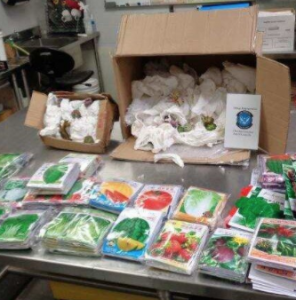By Tom Latek
Kentucky Today
U.S. Customs and Border Protection Agriculture Specialists in Louisville have been busy this spring, seeing a large increase in prohibited shipments that could cause a threat to farming communities.
According to the CBP, one of the most common items seized are live plants and seeds for planting.
Most of the shipments come from China and are prohibited under the Plant Protection Act, because they lack the required permits and certificates. Live plants and seeds are high risk for plant pests, including insects, diseases, and weeds.

The live insect shipments Agriculture Specialist have encountered are also regulated under the PPA and by U.S. Fish and Wildlife.
Additionally, many animal products have been seized, which are prohibited because they carry livestock diseases.
One such seizure was declared as “plastic samples” but was foil bags of duck tongues, a delicacy in China. Other items commonly seized are live eggs for hatching. These are prohibited because hatching eggs can carry Newcastle disease and Avian Influenza.
The CBP says the shippers of these items’ mis-manifest or hide their contraband in their packages: insect eggs smuggled inside stuffed animals, pears from Korea, manifested as Hair Bands, and strawberries from China, manifested as Ladies Sweaters, pose a risk of various plant pests, including Oriental Fruit Fly.
“Live plants can harbor pests and diseases that, if introduced into our agriculture systems or natural resources, could cause significant damage to our food supply or native species,” said Thomas Mahn, Port Director-Louisville. “Our agriculture specialists are dedicated to protecting these essential American resources from foreign pests and diseases.”
During a typical day last year, CBP agriculture specialists across the nation seized 3,091 prohibited plant, meat, animal byproducts, and soil, and intercepted 250 insect pests at U.S. ports of entry.
You may recall last July, Kentucky Commissioner of Agriculture Ryan Quarles issued a warning to Kentuckians about unsolicited foreign seeds they received in the mail, primarily from China.
After receiving hundreds of phone calls and emails, his office created a webpage with information about steps to take if people have received unsolicited seeds from foreign countries.






















